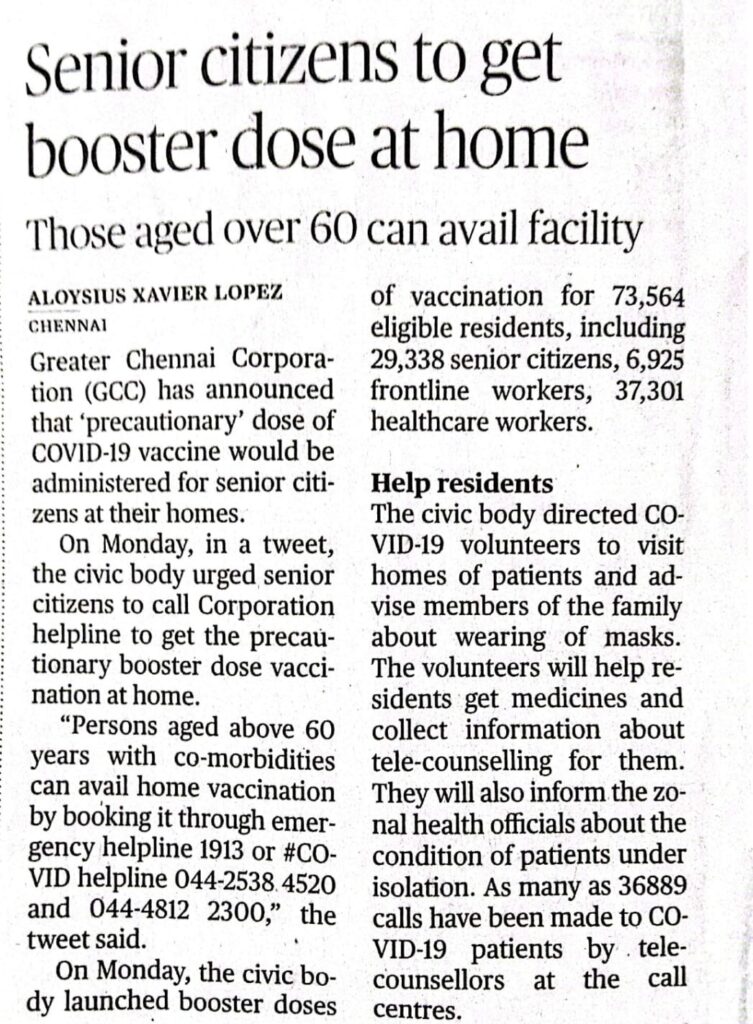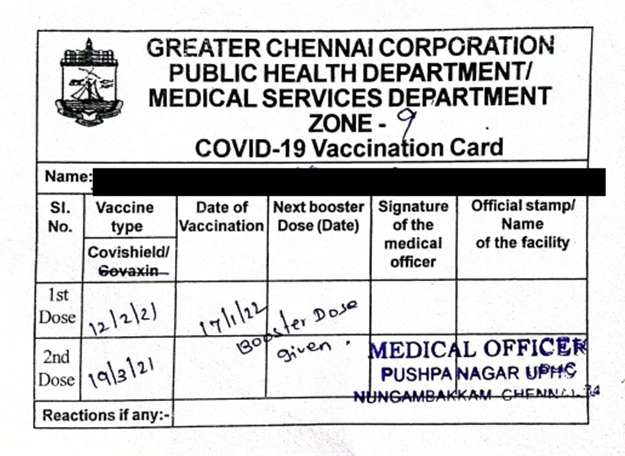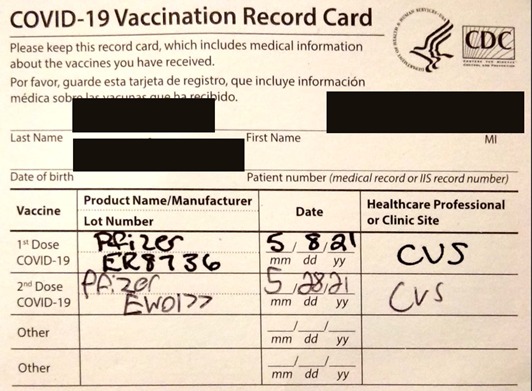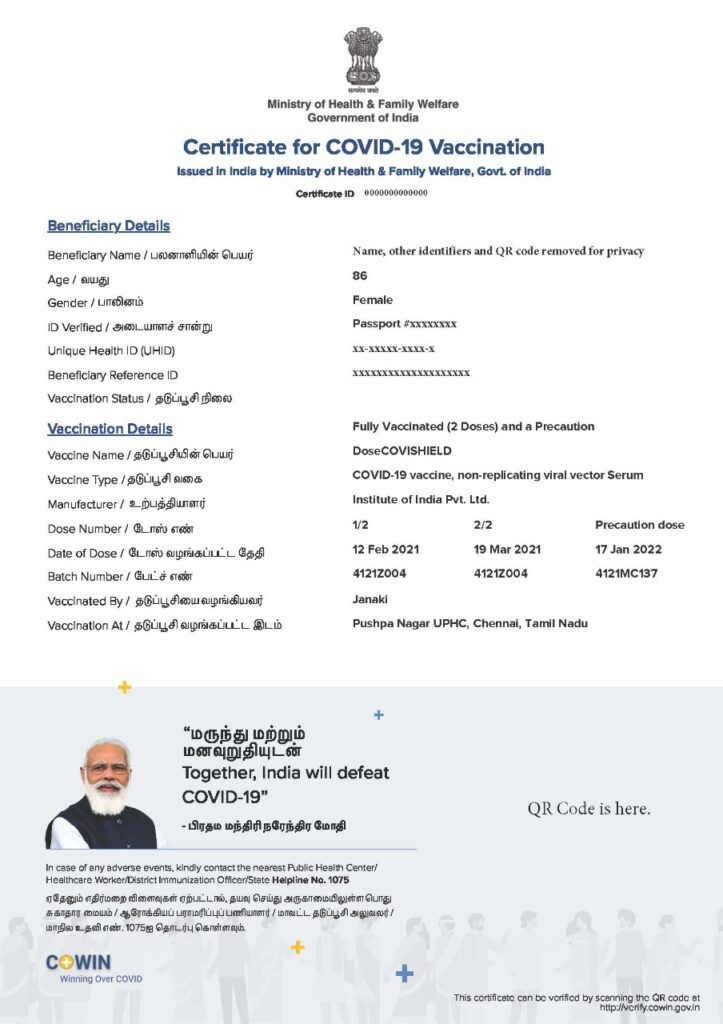Covid Vaccines and Travel Tests in USA and India
On January 11th 2022, The Hindu newspaper had an article that said that the Corporation of Chennai would come to citizens’ homes to administer COVID booster vaccines to those over 60 with comorbidities.

The next evening, I called the 2nd number listed in that article. The phone was picked up almost instantly. I said that I was calling to request at home vaccination for an elderly person. The gentleman at the other end, was very courteous and exceedingly professional. He asked for my mother-in-law’s name, age, co-morbidities, the date of administration of the second dose, address of the patient and phone number. And nothing else. He said I would be contacted by the local ward office for the actual administration.
The subsequent three days, 13th, 14th and 15th were public holidays for Pongal. 16th was a Sunday. Yesterday morning, the first business day after my placing the request, I got a call from a gentleman asking for my mother-in-law by name and stating it was for the at-home vaccination – when could they come over, he asked. I told them that right away was fine, and they were at home within 15 minutes.
A young female nurse arrived, attired in pristine blue scrubs with a proper name tag, masked and hair tightly pulled back, accompanied by a gentleman, also masked, with a thermal cold case in hand and a notebook. The nurse asked for my mother-in-law’s Aadhaar card (which my husband pulled up from his phone) and her prior Covid vaccine certificates (which I pulled out on my laptop right then from the government’s centralised CoWin portal – cowin.gov.in). She filled those particulars in the notebook she had brought with her and then filled out a card with dates of all three vaccinations and the health centre that administered it.
The nurse then reconfirmed what vaccine she had had previously and accordingly proceeded to unwrap a new syringe from a packet and a vial of Covishield and injected the same into my mother-in-law’s upper arm (wearing a very loose sleeved garment at the time of vaccination is very helpful so that it can be pulled up without difficulty – these are intra-muscular vaccines and injected quite high in the upper arm). She then gave us the card as immediate proof and a 500 mg tablet of Paracetamol (to be taken if needed) and both lady and gentleman left without any ado.

Within an hour and a half, I got an SMS on my phone addressed to my mother-in-law saying that her precautionary dose was given and that I could check the particulars on CoWin. Sure enough, it was there. A quiet, streamlined process with no bells and whistles, but oh, how convenient! It could not be any better. A post on our initial experiences on vaccinations, from early last year in both countries, is here: https://bit.ly/3KojTft
Our family of five, ranging in age from 16-86, has received three different Covid vaccines (Covishield, Covaxin and Pfizer) in two countries, USA and India and in three cities. We have received our vaccinations at hospitals (public and private), pharmacies and schools and availed of at-home services too. Between four of us, we have done over 9 round trips between the US and India during the pandemic alone, giving us rather extensive experience on travel-related RT-PCR tests too. All this has given us good end-user perspective of the relative efficiency and ease of vaccination and travel testing in the two countries. Here is an evaluation based on our personal experiences and conversation with discerning friends and family in both countries based on their observations too.
It is easy to get vaccines in both countries but a tad easier in the USA because a) the vaccine is administered in non-hospital and clinic settings like grocery stores and pharmacies too and b) there is no charge for the vaccine regardless of where it is administered. Both India and the USA offer three available vaccines with no overlap. Pfizer, Moderna and Johnson and Johnson in the USA and Covishield (Astra Zeneca/Oxford), Covaxin (entirely made in India by Bharat Biotech) and the Russian Sputnik V in India. Public/government facilities in India offer only Covishield or Covaxin. In the USA, one can get a vaccine at many places on a walk-in basis by just producing a photo Id. Some outlets offer specific appointments too. It is unclear whether there is any centralised database of vaccinations at all. It is possible there are databases at the state level but I have been unable to access any credible documentation on the same. Regardless, there is no standard portal for patients to access COVID vaccines received. vaccines is allowed in the USA – it is entirely your choice. The card given at the time of vaccination is smaller than the average business card, is the only proof you get and cannot be regenerated anywhere (since there is no end-user accessible database) and therefore should be looked after very carefully.

While walk-ins are taken in many places in India, it is strongly suggested that one fixes an appointment via the centralised COVID vaccination portal, called CoWin, administered by the government. The portal is accessed by entering the registered mobile phone number, and then by entering the OTP (one time password that will be sent to the phone). Multiple people can be registered to one phone number. One can get the vaccine for free at government hospitals and public health centres available in every neighbourhood – and, of course, as mentioned above, at least in the city of Chennai, free at-home services are available for eligible elderly. The vaccine is also offered in many private hospitals and clinics for a charge (which can vary but is mandated not to exceed INR 1,410 (~US$19)). This allows you to see where the vaccine is available closest to you, when and how many appointments are available, and how much it will cost (if any). All jabs are registered by the provider on the CoWin portal with minutes of being administered. This means that, unless something awry occurs, one can ONLY get the allowed number of jabs. It also means that one can get one jab in one town and another in a completely different one in another corner of the country without carrying any paperwork in hand. One is not allowed to combine vaccines. All jabs, including the booster, have to be of the same variety. Currently, only those aged 60 and over, with co-morbidities, who got their vaccines 9 months ago or earlier, are eligible for the booster. The CoWin app tracks all this and records are checked prior to administration of subsequent doses. Also, for those not aware, Indian nationals have to tie their Covid vaccination certificates to their passports for international travel – also easily done on the CoWin portal. I will be happy to assist if needed.
In both countries, anyone of any citizenship is eligible to get the vaccination with appropriate photo ID. The major difference between the two countries lies in the proof of vaccination. In the USA, the tiny card received, smaller than the average business card, has most particulars often handwritten. It would be easy to dismiss it as an unimportant piece of paper and accidentally throw it away. In India, the CoWin portal allows one to download and print vaccination certificates, with official insignia and QR code, on demand. A huge load off the mind for anyone who travels.

Now, coming to RT-PCR tests. I will restrict the scope here to only international travel-related tests and, more specifically, to travel between the USA and India. The requirement to enter the USA now is a negative test administered no earlier than the day before travel. I have chosen my words carefully – it is a day – not 24 hours – meaning you could fly as late as 11.59 pm on Day 2 and have the test taken as early as 12.01 am on Day one – it sounds like two days, but actually is not. However, it definitely offers more leeway than the specific stipulation of 24 hours. Those arriving in India from the USA, and other countries classified as non-risk, require a test administered no earlier than 72 hours prior to departure.
Getting an RT-PCR test in the USA with a guaranteed turnaround is much more difficult than in India. When I flew to India for the first time post-pandemic in September 2020, I was literally the first from my town in PA to make a trip to India since the onset of the pandemic. It took more than 20 phone calls to find the one and only lab that guaranteed on-time turn around (25 miles away – a huge distance in a town that is effectively encompassed in a radius of 5 miles). Believe it or not, now, more than 16 months later, that continues to be the case. I had thought it was a small-town PA problem but I have subsequently heard from many travelers, as recently as a couple of weeks ago, and from much bigger cities like San Francisco CA and Hartford CT, that they really struggle to get tests. The problem stems from the assured turn around needed crucially for travel. While there are many outlets, including pharmacies, that offer tests, most offer turn arounds that are specified in days (usually business days), and always qualified with words like ‘mostly’ – meaning that there IS no guarantee – checking on periodic status of tests in such outlets with a real person is next to impossible. When expensive and important travel hinges on the results of the test, such outlets prove unviable. Many travellers have reported getting multiple tests done at multiple places hoping at least one comes through on time. Each test costs between $125 – $250 (~INR 9,400 – INR 18,800).
In India, RT-PCR tests can be done in the comfort of one’s home (if you wish) at a time one specifies (as early as 6 am) with the cost ranging from INR 1,000 to INR 2,000 (~US $13.5 to US$17). The test results, with necessary QR code, are almost always received within 24 hours, and if done before noon, within 6 hours itself. Our personal experience here is restricted to the major cities, but many second-tier cities, I hear, offer similar services. Major airports are also offering Covid testing on site.
When we plan travel from the USA to India now, our minds are now always filled with some anxiety arising exclusively from the necessary testing – trips cannot be scheduled on Mondays, ideally not on Tuesdays too, since most facilities do not operate on Sundays. In India, there ARE facilities that operate on Sundays too, and getting the test done has now become as routine as packing a suitcase for travel. Just one more chore to get done.
Covid is something that makes all of us anxious at various levels. Misinformation makes it worse. The purpose of this post is to set down facts from my family’s personal experience, backed up by reference to authoritative websites, with comparative information obtained from discerning individuals. If anyone needs clarification or has questions, please do not hesitate to ask. I will be happy to share what I know as best as possible.
Related Links:
You are truly a prolific writer Vidya.
When I visited you a couple of days ago, you were so calm and collected. I would have never guessed that this article was churning in your head.
You are so gifted!
You are, as always, too kind, Gita!
Valuable and comprehensive comparison. Bookmarked!
Thank you, Swami. Now, India no longer requires RT-PCR tests for fully vaccinated passengers. And they have also removed the delineation of restricted and unrestricted countries.